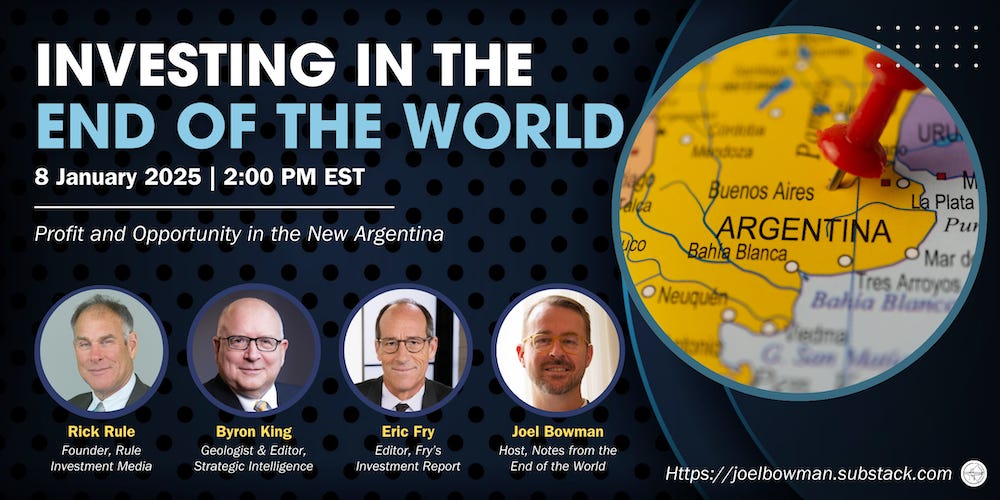
“If you wish to know how libertarians regard the State and any of its acts, simply think of the State as a criminal band, and all of the libertarian attitudes will logically fall into place.”
~ Murray Rothbard, For a New Liberty (1973)
Joel Bowman with today’s Note From the End of the World: Buenos Aires, Argentina…
It’s “Morning in Argentina,” dear reader, and the sun has just crept above the horizon…
Earlier this week, Javier Milei’s government announced that the country has officially exited recession, with the economy growing at almost 4% in the third quarter. Here’s CNN, reporting through firmly gritted teeth…
Argentina has come out of a deep recession in a major victory for the country’s unorthodox President Javier Milei, who has spent the past year enacting sweeping — and painful — reforms in Latin America’s third-largest economy.
Gross domestic product grew 3.9% in the July-to-September quarter compared with the previous three months, Argentina’s statistics agency said Monday. The agriculture and mining sectors drove the expansion, with consumer spending also growing strongly. But manufacturing and construction suffered sharp declines in output.
The news of the economic rebound comes a year after Milei was elected on a ticket to tackle chronic hyperinflation and overhaul the long-suffering economy. He has slashed government spending, reducing sky-high inflation and helping repair the country’s finances.
Markets responded as one might expect given the hopeful news, with the Merval Index (which tracks two dozen of the country’s blue chip stocks) up 7% on the session… to bring the yearly gains to ~175%. Morgan Stanley also upgraded Argentine banks, citing Milei’s government’s progress:
“Our decision revolves around the normalization of the economy.”
It’s been a long time since anyone – least of all a foreign investment bank – referred to the Argentine economy as “normal” anything. And yet, Argentine bank shares soared 14% for the day, while JP Morgan’s all important Country Risk Index continued to fall (a lower reading implies more investor confidence).
It was last seen (at time of writing) around 665 points… having started the year at over 2,000 points. This figure represents the lowest risk rating for the country in half a decade.
Naysaying Ninnies
Of course, 2024 wasn’t all smooth sailing. Indeed, there’s been no shortage of hyperventilating detractors along the way, including those in the mainstream news who were hoping to feel the cold rush of blood in the streets. You remember the headlines, right?
Who is Javier Milei? Argentina’s new far-right president ‘El Loco’ takes the stage ~ The Guardian (Nov, ‘23)
Javier Milei Is the World’s Latest Wannabe Fascist ~ Foreign Policy (Dec, ‘23)
Javier Milei: Argentines wait for ‘crazy’ president’s shock therapy to work ~ BBC (February)
Milei’s anarcho-capitalist dream collides with Argentine reality ~ Financial Times (May)
And on… and on… and on…
One is left to wonder, where are these squawking hacks now, after the “far-right fascist” brought his nation’s embattled currency back from the brink of hyperinflation (the Argentine peso overtook the Venezuelan bolivar in the “Ugliest Fiat at the Fare” competition last year)… to make it the strongest performing currency on the planet in 2024?
After his administration crushed inflation on the Pampas from 25.5% per month when he took office… to 2.4% and rapidly falling presently? (Latest monthly inflation figures show Services falling to 2.3%, Communication and Home Goods both dropping to 1.5%, while the all-important Food and Beverages dipped under 1%, to 0.9%.)
What now, after the Leviathan has been brought to heel, since regulations have been slashed, budget deficits ended for good and whole sectors of the bloated administrative state either streamlined, privatized or abolished altogether?
The sun still rose in the east this morning… the parks and plazas are still filled with children’s laughter and the smell of juicy steaks on the parrilla… and the malbec still flows freely in the corner cafés.
Where is the fire and brimstone we were assured would follow liberty and freed markets on the banks of the Rio de la Plata?
Should the much-ridiculed anarcho-capitalists among us – we fringe-dwellers who have long championed such whacky concepts as private property, rule of law and voluntary trade – be expecting an apology anytime soon? How about a postcard from former Enron consultant, Paul Krugman? Anything from Robert Reich or Uki Goñi? A mere “mea culpa” from a single one of the bloviating sock-puppets disgracing the once-relevant mastheads of the world?
Happily, individualists do not rely on the approval of the majority for their blessings. (If we did, we’d have been consigned to purgatory long ago!) Rather, it is reward enough to see positive changes in the real world, behind the headline numbers, where pro-market policies impact real people.
Nike and Coca-Cola
Meanwhile, in our own little household…
“It must be like when the Soviets finally got Nike and Coca-Cola.”
Dear Wifey had been chatting with the babysitter. Sabri is an entrepreneurial young woman in her mid-twenties. In addition to being a full-time nursing student, she earns money on the side babysitting. Eli, her mother, helps out too, in addition to running a small business selling items online through MercadoLibre (literally “Free Market” in Spanish, it’s essentially the Latin American version of Amazon).
Often the best source of information around, “gig economy” workers are up there with taxi drivers, barbers and barkeeps when it comes to having an “ear to the street.” They know what’s up, often before the “experts” on television and in the popular presses. And they’re savvy, mostly because they have to be.
“We’ll do our Christmas shopping after the New Year,” Sabri informed Dear Wifey, as the latter handed the former her yearly (cash) bonus. “That’s when we’ll see all the foreign products on the shelves.”
Thanks to sweeping import reforms, foreign goods are flooding into Argentine stores, especially the online “free market” giant. Here’s HKTDC Research with happy news for Argentines right in time for the holidays…
In Argentina, President Javier Milei continues to tear down the bureaucratic barriers that have historically made importing into the country a very difficult endeavour. Perhaps most importantly, the Argentinean government has said that the 7.5 percent special PAIS tax on foreign exchange purchases for import operations will be allowed to expire as scheduled on 24 December.
An economy emerging from recession… access to quality foreign goods… and a currency back from the dead to buy presents for the family. If we didn’t know better, we’d be tempted to say it was a Christmas miracle.
Stay tuned for more Notes From the End of the World…
Cheers,
Joel Bowman
P.S. Attention Notes readers! Are you ready for our inaugural Investing in the End of the World Virtual Summit? Well, mark your calendar!
The event – featuring Rick Rule, Eric Fry and Byron King – will take place Jan. 8 between 2-4pm Eastern Time.
Space is limited so you’ll want to be nimble. Register Here…

P.P.S Please note also that Notes Members will be given priority access, as well as receive a complete audio-video recording of the event AND a full transcript to peruse at their convenience. It’s our way of saying “thanks” to our kind members for their support over the past year… and a way to kick off a whole bunch of new member benefits and perks in ‘25 and beyond!
~~ Joel Bowman, Notes From the End of the World



